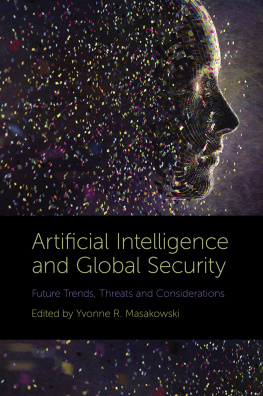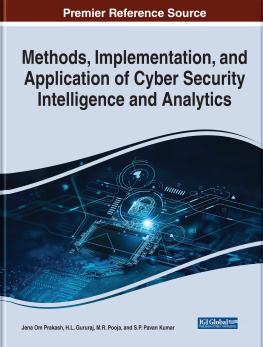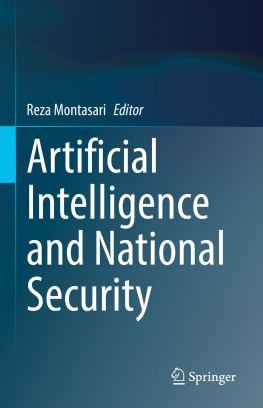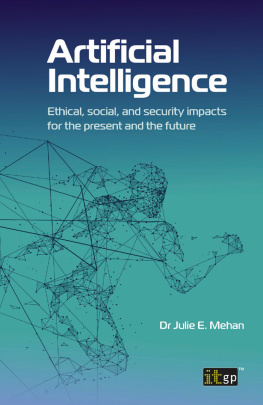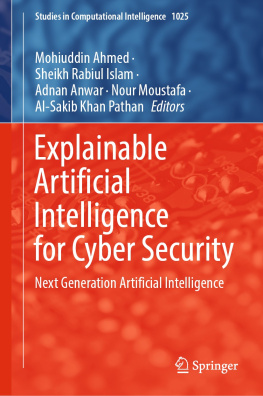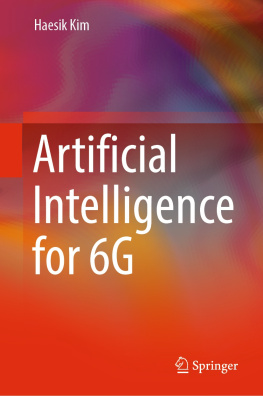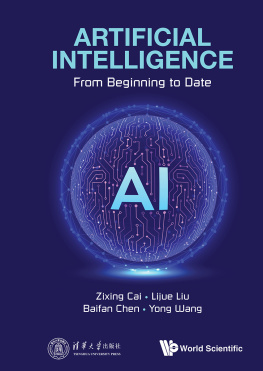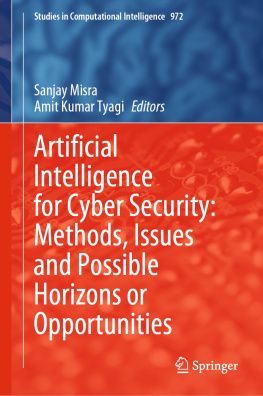R. Masakowski Yvonne - Artificial Intelligence and Global Security
Here you can read online R. Masakowski Yvonne - Artificial Intelligence and Global Security full text of the book (entire story) in english for free. Download pdf and epub, get meaning, cover and reviews about this ebook. year: 2020, publisher: Emerald Publishing Limited, genre: Politics. Description of the work, (preface) as well as reviews are available. Best literature library LitArk.com created for fans of good reading and offers a wide selection of genres:
Romance novel
Science fiction
Adventure
Detective
Science
History
Home and family
Prose
Art
Politics
Computer
Non-fiction
Religion
Business
Children
Humor
Choose a favorite category and find really read worthwhile books. Enjoy immersion in the world of imagination, feel the emotions of the characters or learn something new for yourself, make an fascinating discovery.
- Book:Artificial Intelligence and Global Security
- Author:
- Publisher:Emerald Publishing Limited
- Genre:
- Year:2020
- Rating:4 / 5
- Favourites:Add to favourites
- Your mark:
- 80
- 1
- 2
- 3
- 4
- 5
Artificial Intelligence and Global Security: summary, description and annotation
We offer to read an annotation, description, summary or preface (depends on what the author of the book "Artificial Intelligence and Global Security" wrote himself). If you haven't found the necessary information about the book — write in the comments, we will try to find it.
Artificial Intelligence and Global Security — read online for free the complete book (whole text) full work
Below is the text of the book, divided by pages. System saving the place of the last page read, allows you to conveniently read the book "Artificial Intelligence and Global Security" online for free, without having to search again every time where you left off. Put a bookmark, and you can go to the page where you finished reading at any time.
Font size:
Interval:
Bookmark:
Artificial Intelligence and the Future Global Security Environment
Yvonne R. Masakowski
Advances in Artificial Intelligence (AI) technologies and Autonomous Unmanned Vehicles are shaping our daily lives, society, and will continue to transform how we will fight future wars. Advances in AI technologies have fueled an explosion of interest in the military and political domain. As AI technologies evolve, there will be increased reliance on these systems to maintain global security. For the individual and society, AI presents challenges related to surveillance, personal freedom, and privacy. For the military, we will need to exploit advances in AI technologies to support the warfighter and ensure global security. The integration of AI technologies in the battlespace presents advantages, costs, and risks in the future battlespace. This chapter will examine the issues related to advances in AI technologies, as we examine the benefits, costs, and risks associated with integrating AI and autonomous systems in society and in the future battlespace.
Keywords: Artificial intelligence; future; autonomous; unmanned; decision-making; modeling; deep learning; military; strategy; tactics
The world is very different now. For man holds in his mortal hands the power to abolish all forms of human poverty and all forms of human life. John Fitzgerald Kennedy.
The next world war will not be focused on who fired the first shot. Rather, future warfare will be focused on the control and dissemination of information across all domains, including information about everything and everyone! AI networks will serve as the grid and blueprint of the new battlespace of the twenty-first century. Becoming the leader in Artificial Intelligence (AI) is the key to achieving global dominance. Nations will use AI technological superiority to shape the geopolitical, social, and economic environment to their nation's strategic advantage. Nations will integrate AI technologies and networks across a wide spectrum of applications to expand and enhance their economic, geopolitical, and military agendas. Advances in AI will influence every phase of humanity and daily life, thereby impacting the individual, society, and shaping the battlespace of war.
As nations strive to address each of these global challenges, they seek to identify tools and technologies that will support them in their decisions during times of crises across a range of domains. We see AI being used today during the Global Pandemic in the development of models and surveillance systems to monitor peoples movements and travel patterns on a local and global level. Nations require information management tools that help to sort through the elements of crisis management, such as logistics, personnel management, supply chains, the distribution of goods, and technologies for maintaining regional security ().
AI affords the military and nongovernment agencies the means of managing and analyzing large data sets and supporting decision-making at all levels (). Indeed, there is a great deal of enthusiasm for the development of AI-enabled technologies to improve daily life and enhance warfare. AI technologies serve as a force multiplier for the military as it can streamline the information pipeline, analyze data, and accelerate the decision cycle. However, we contend that it is essential to keep the human-in-the-loop as they alone have the ability to understand context and integrate the nuances of contextual information across a wide domain of contributing factors that the AI system has yet to master (e.g., culture, organizational hierarchy, etc.).
AI technologies, to some extent, have been overpromised and underdelivered as people become excited about its capabilities and often misunderstand the complexities and limitations of AI systems. Simply stated, you can't buy a pound of AI and insert it like plaster in a crack in the wall. You have to first understand the problem and related issues within the context of the situation itself. This requires knowledge and understanding of the situation in which you want to deploy AI as part of a network, part of the organization, or merely augment a human decision-maker's thinking. One of the principal advantages for the military is to develop adaptive and agile AI networks that will facilitate information management during times of crises.
Distributed sensors collecting information across all domains including air, land, sea, undersea, and in space will be analyzed and managed by integrated and distributed AI networks. Satellites will be linked as information nodes within the grid of AI networks emanating across all domains and at all levels to capture data and attempt to make sense of it all. AI is the key to achieving global dominance for all nations seeking to control information across all domains to their strategic advantage! China and Russia have provided evidence for this objective in their national strategic strategies.
China has put its stake in the ground stating that it aims to be the global leader of AI technologies by 2030 and is well on its way to make good with its claim (). China has invested heavily in AI technologies for numerous applications, from facial recognition for identity management, population control, resource management (i.e., water, minerals, materials, etc.) to manufacturing applications. China has provided further evidence of the potential impact of AI technologies on society and global security.
Likewise, Russia has invested in AI to shape their global political and strategic objectives. Their nation is investing in AI to weaponize information to their political and strategic advantage. Regardless of our personal or political views, the fact is that AI technologies have facilitated new, advanced capabilities. The question is: What type of future do we want to create? How can democratic nations use AI technologies to ensure global security?
Advances in AI technologies will provide a means of safeguarding a stable environment in which the national security strategy, productivity, and economic progress is ensured. Indeed, national strategies are designed to ensure economic and geopolitical stability. In the book, Future Smart, we are advised about game-changing trends that will shape the future of business and warfare. (). He further hypothesizes that the impact of AI will be further accelerated by the integration of quantum computing, as well as advances in batteries, and materials. One can extrapolate from this hypothesis that the integration of AI advances with new materials, batteries, and computing power will only expand and enhance its capabilities. Time to decide and act will grow shorter with each advance! Each advance in AI technology and computing power increases the level of risk in global security as advances will present new and unanticipated challenges to maintain global security.
China is aware of these benefits and has already integrated AI technologies in the design of what they call, Intelligentization of design ( intelligentized systems will continue to expand and contribute to a network of self-sustaining, automated systems capable of manufacturing a host of products, technologies, systems, and tools of war.
We recognize that AI is having an impact on society, politics, economics, and gains in manufacturing capabilities. Advances in AI are also having significant effects on the battlespace and twenty-first century warfare. AI networks have accelerated the decision cycle for the warfighter and for the adversary. AI networks and intelligent agents can quickly detect, collect and analyze data to inform decisions and make recommendations for the benefit of the decision maker. However, these same capabilities may also prove to be a weapon in the hands of the adversary. The real advantage democratic nations have is its people. From the American Revolution through the Space race, the human spirit has launched mankind into new territories. This time is no different. Humans have a pioneering spirit and adapt quickly to change. This is such a time that calls for adaptation and innovation.
Font size:
Interval:
Bookmark:
Similar books «Artificial Intelligence and Global Security»
Look at similar books to Artificial Intelligence and Global Security. We have selected literature similar in name and meaning in the hope of providing readers with more options to find new, interesting, not yet read works.
Discussion, reviews of the book Artificial Intelligence and Global Security and just readers' own opinions. Leave your comments, write what you think about the work, its meaning or the main characters. Specify what exactly you liked and what you didn't like, and why you think so.

